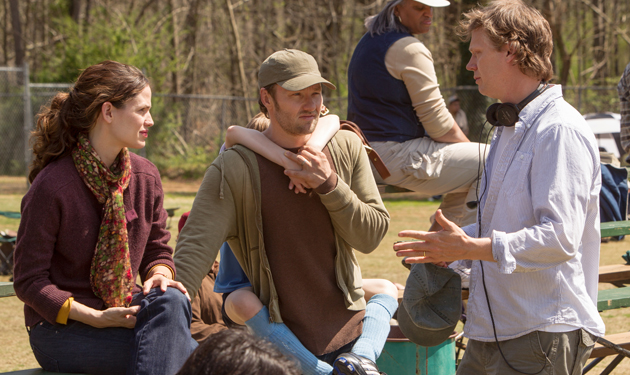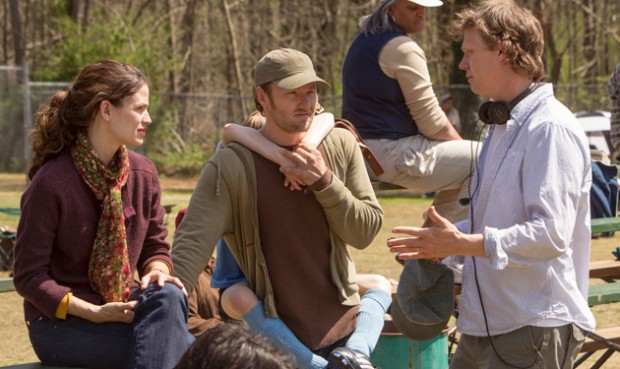
Now in theaters is Peter Hedges‘ latest directorial effort, The Odd Life of Timothy Green. The film stars Jennifer Garner and Joel Edgerton as two parents that are unable to conceive despite numerous procedures and efforts. One night they decide to name everything they want in a kid and later that night, he is born in their garden. CJ Adams stars as Timothy, the garden miracle boy who gives them everything they could have ever wanted and more. Earlier this week I had a chance to speak with Hedges over the phone as we talked about keeping the mystical low-key, working with people you run to work with, and the genesis of the film.
The Film Stage: You have veterans actors in the film surrounding the young boy [CJ Adams]. I’m curious if that is intentional or just a by-product of a studio film?
Peter Hedges: Any time you’re making a film you want to get the best actors particularly if you make the kind of films I make, which are all about people. So you just get the people that are best for the roles. People who understand the parts, in these three cases [Jennifer Garner, Joel Edgerton, and Adams], better than I do. So that’s it. It’s really that simple. You find people who you want to run to work with everyday and that’s what I had in those three.
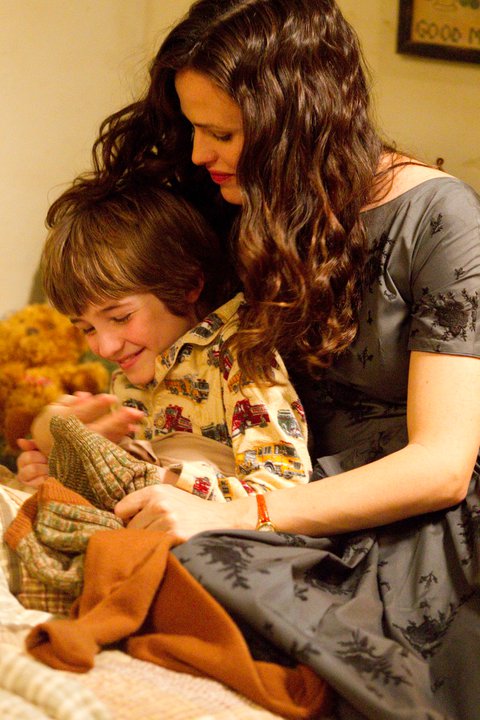 If I’m not mistaken, you haven’t frequently collaborated with any particular actors. You mentioned clearly right now that you want to work with people that you run to work with. Is there something about the scheduling?
If I’m not mistaken, you haven’t frequently collaborated with any particular actors. You mentioned clearly right now that you want to work with people that you run to work with. Is there something about the scheduling?
Hedges: I’ve had Allison Pill in two of my films. There was no role for her in this film. Dianne Wiest I got to have a second time. Sometimes it’s people aren’t available. I can’t think of an actor I wouldn’t kill to work with again that I’ve had in any of my films. Sometimes it’s timing. Sometimes it’s… I’ve only made three films in ten years. One of my fantasies is to do a project where I literally just write down all the people I can’t wait to work with again and just write something that involves them all. But it’s a film by film process. I hope that when I approach them again that they’ll want to do a film with me again. I was thrilled when Dianne said yes. And CJ Adams had, of course, been in Dan in Real Life. As a six-year-old boy we found him in Rhode Island. He’s not been in any other films in the interim. He came in and I thought it was great to see him, but I couldn’t imagine that he was going to beat out every kid in America for this role because there were so many kids with more experience. And he just kept coming back and in every call-back he got better and better. Then it became evident that he was to be Timothy.
You’ve co-written the films that you’ve directed, and clearly you have a writing background with What’s Eating Gilbert Grape and a couple of other notable films. From my understanding, the WGA makes it very difficult for directors to get writing credit on pieces that they didn’t originally write.
Hedges: That’s true.
How important was it for you to get writing credit, pitch in, and give your two cents on this particular film?
Hedges: Well on this film Ahmet [Zappa] came to me and said, ‘I’m going to tell you a story,’ and he told me the story. It didn’t take long. Most of what was there was the beginning of the story. Then it seemed like from there, so much could happen. He was very clear that he wanted me to take it and run with it. I really loved the setup. I love the conceit that this couple couldn’t have a kid, and they planted him in the ground. But there wasn’t going to be enough for a whole film. I really had his blessing and he was producer on the film and we talked. And everyone working on the film helped me. I basically adopted what he had as a story. I grew it, helped to raise it, into a different and fuller story. In Dan In Real Life there was a preexisting script which I was asked to rewrite. So I rewrote that script. I never thought I was going to direct that movie until after I finished it.
But it’s not as important to me that everything comes from me. It’s important that I be able to impact it and… I don’t write on the typewriter, but if I did I would say, ‘I need to put it through my typewriter.’ So that I actually understand what the story is that I’m supposed to be telling. It’s important to me to get some kind of writing credit because I’m doing a lot of the writing. But in those two instances, I didn’t do all of the writing. The concept for Timothy Green came from Ahmet and in the case of Dan In Real Life, Pierce Gardner had already written a draft. I rewrote it and I added a bunch of things and I kept some things. One of my favorite movies is Tootsie. There were 12 writers that worked on Tootsie. Only two are credited, but 12 worked on it and sometimes it takes 12 writers, and sometimes it takes one. The main things isn’t even so much the credit but the story. What it takes to get a story to the point where it’s ready to be shared with the world. That’s a subjective decision that is not only made by me, but also by the people who are financing the film. The people who are releasing it. So a lot of people get involved. But ultimately I know that I’m a person with limited talent. That I can’t tell any kind of story. There are writers that can work in all sorts of different genres. Maybe I could, but what I’m looking for is a story I ache and yearn to put into the world. When I go, ‘I can’t wait to tell this story. I have to tell this story,’ then I’m ready to make a film. So far, and this may change, every time it’s been a story, it’s either been something I originated or something I rewrote so significantly that it feels as if I’m an author of it. I’m not the only author, but I’m the parent of this project.
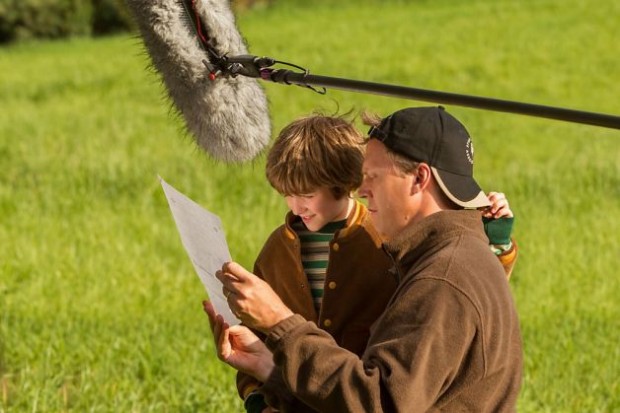
You mentioned that Ahmet Zappa came to you with this story idea. Clearly films like this could go really broad or really highlight the mystical elements of it. Instead it just seems like that is the setup and the conclusion. Everything else in between is very grounded in reality and low-key. What was the decision behind that?
Hedges: That’s a very good question. I think any child that exists is born out of magic. It’s a miracle that anybody’s here. When you think of history or all that could have gotten in the way or interrupted us, well we’re here and it’s a miracle. But the part of this opportunity that most appealed to me was this opportunity to explore what it means to be in a family in the 21st century. To make a family. To recover from a family. To survive the family that you come from or create the family of your dreams. That is something that is very universal. Every if you don’t want to have children or plan to have children, you are a child or were a child once. So I very much wanted to make a film where there would be something for most everybody in it to experience. I’m also interested in achievable magic. While there’s a magical component to this story, the majority of what I wanted to suggest was that magic’s possible. It’s actually tactile and tangible; it can be grasped. Where do the magic moments come from? How do they happen in life? They happen when we get out of the way of life. They happen when we love and when we’re open to be loved. They also happen when we’re willing to risk in an extension of that love. We’re willing to take chances. We’re going to do our best. We’re going to make mistakes. I wondered if, yes, there’s a kind of otherworldly magic that’s in the story but I wanted most of the magic to be borne out of human longing… human behavior and humans colliding. Making a mess of life. That’s the kind of story I wanted to put into the world.
I also try to imagine an audience member. There are people who really traffic in the magical. They want everything to be magical when they go to the movies. Then there are people who sit with their arms crossed and just never buy into baseball players coming out of a corn field. Or an angel coming down from heaven and showing Jimmy Stewart what life would have been like if he hadn’t existed. Or red slippers being clicked and saying, ‘There’s no place like home.’ Or a kid saying, ‘I want to be big’ and becoming big. Waking up and he’s big and having to deal with that. So for me, it was a question of, what’s too much magic? And already I’ve heard from some people, ‘I could have taken more magic.’ Others have said, ‘I would have liked this movie better if there wasn’t magic.’ So I tried to make a film that had just the necessary amount of magic. That didn’t overuse it or overrely on it. Most of us are ordinary. I want to make films for most of us. We’re ordinary people who are capable of extraordinary moments. But most of the time we’re ordinary. I liked the idea of Timothy being ordinary. I liked the idea of him being a bit odd. There’s something different about him that people want to hide or keep secret because people aren’t going to understand and this kid is going to be tortured. We live in time where any kid who’s a bit different or a bit odd is bullied or made fun of. Tolerance is a huge issue and the need for more tolerance for each other. In our political discourse and in our social lives, in our communities. We need to become more accepting of our different positions. The ultimate truth is that we have much more in common than we have differences.
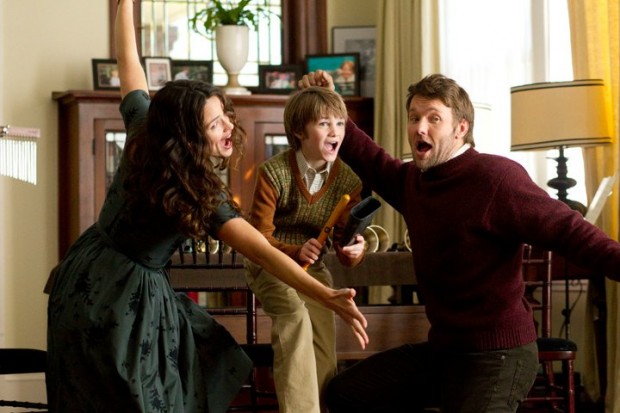
It was just a question of how much magic and what is too much magic. How literal to be in the story and at what point was there enough magic. You don’t know when you’re making a film. It was a bit of a process. In one cut of the film I put in a little more or I’d take some out. I’d over explain certain things and sometimes the more I explained things, the more I needed to explain other things. So you look to your collaborators and say, ‘Look, this is what I’m trying to do. What do you think?’ So hopefully you’ve hired the right editor. Which in this case, I did. And that the right producers are around you. Then you show it to a couple of audiences and talk to them afterwards. Try to understand what they’re getting from it. Is there something in this film for kids? The movie isn’t full of all sorts of broad, comedic moments that are predominant in most films aimed at kids. Because we’re so deathly afraid our kids will get bored. So I was always trying to keep track of is there enough here for kids and is there enough for adults? Is there something here for something that may not want to have children, but, you know, is a child or was a child. It’s just a process of constantly checking it. All stories are ultimately manipulative, if you’re honest about it, you say, ‘Yea,’ you’re trying to get people to a certain place or feel a certain thing. But there’s that kind of manipulation that feels like shortcuts or cheating. Almost like emotional pornography. Then there are other stories you watch where everything felt natural or right. This one was the hardest one I had to tell because of the magical element because I wanted it to be as real and rooted as all of my other films. And yet it had this whole other… room, if it was a house. Everything was borne out of a miracle. In my narrow world right now, when you watch it in test screenings. I’ve watched it a lot with audiences full of people I don’t know. It’s pretty close to working the way I had hoped.
You mentioned already that you’re trying to make a film about raising a family in the 21st century. You mentioned in another interview that parents are thinking, maybe for the very first time, ‘Maybe my kids don’t have it better than me. Maybe this is going to be quite difficult for them.’ There’s a part in the film that deals very heavily with that. How much of that was in the original script and how much did that develop over time?
Hedges: Well, that wasn’t in the original story at all. I mean the original story is really an origin story. The original concept Ahmet had was that Timothy was really magical. He was going to be able to fly and stand on leaves. But that was kind of the original idea. Every time the parents said no to Timothy, he would lose a leaf. Then he would shrivel up and die and the parents would cry and realize they had been bad parents, and that would bring him back to life and they would live happily ever after. To be honest, that’s what it originally was. The minute Ahmet told me that story I said ‘I love the beginning of the film so much but I think the parents’ job is to say no. I mean, that’s all I do is say no. As we talked. As Ahmet and I talked, it was how to make this story relevant for now. The fact is that the environment is getting scarier. The standards can’t keep getting better and better because there aren’t jobs and people are economically stretched the way that they weren’t 20 years ago. It’s just a really hard time. Maybe the uses of a story like this is that we can realign with what real wealth is and real success is. Maybe it’s not about giving our kids better than what we’ve had. Or not about having our kids experience the heartache that we’ve had to experience. It’s actually about creating an environment where they can fully become what they’re supposed to be. So a lot of this movie became about not what I know of being a parent, but what I’m trying to still understand as a parent. I felt like the more personal I made this story, the more invested and exposed I felt through the writing of it, the better chance i had of making something that meant more. It means more to me. It means more to the people with whom I’m working on it. Then that’s the only thing I know. Hopefully it will translate and be relatable to you and to other people who see the film.

The Odd Life of Timothy Green is now in theaters.

